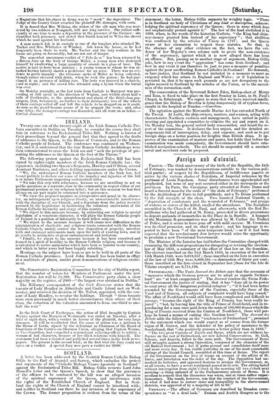IRELAND.
Twenty-one out of the twenty-eight of the Irish Roman Catholic Pre- lates assembled in Dublin on Tuesday, to consider the course they shall take in reference to the Ecclesiastical Titles Bill. Nothing is known of their proceedings beyond the general fact that they agreed to the drafts of addresses to the Queen, to the House of Common; and to the Roman Catholic people of Ireland. The conference was continued on Wednes- day, and it is understood that the four Roman Catholic Archbishops were then commissioned to cross the Irish sea and "seek the privilege of pre- . senting the addresses to the Queen at the foot of the Throne."
The following protest against the Ecclesiastical Titles Bill has been signed by eighty-eight members of the Irish Roman Catholic bar ; the signatures including two Queen's Sergeants, Hawley and O'Brien, several Assistant Barristers, and others holding appointments under the Crown. "We, the undersigned Roman Catholic members of the Irish bar, feel bound publicly to declare our sense of the impolicy and injustice of the bill now before Parliament respecting ecclesiastical titles.
"We take this step with reluctance, because we are unwilling to act on public questions as a separate class in the community in respect either of our professional position or our religious belief; but on this occasion we fear that silence on our part might be construed into acquiescence.
"We view the proposed measure as retrogressive and penal in its charac- ter, an infringement upon religious liberty, an unwarrantable interference with the discipline of our Church, and a departure from the policy recently pursued by the Legislature in facilitating the voluntary endowment of the Roman Catholic hierarchy and clergy of this country. "We object to this measure because, by subjecting our religion to special legislation of a vexatious character, it will place the Roman Catholic people of Ireland in a position of inferiority to their fellow subjects.
"We object to the measure because it will create new difficulties in the ndministration of charitable and religious trusts connected with the Roman Catholic Church, unduly control the free disposition of property, interfere with and endanger settlements made upon the faith of existing laws, and in its results be productive of great embarrassment and irritation. "Finally, we object to the measure because it has been conceived and framed in a spirit of hostility to the Roman Catholic religion, and because it is calculated to revive animosities which have been so baneful to our country, and which in latter years had been happily subsiding."
Meetings on the subject have been or are to be held in all parts of the Roman Catholic provinces. Lord John Russell has been burnt in effigy at a multitude of places, amidst great demonstrations of religious excite- ment.
The Conservative Registration Committee for the city of Dublin report, that the number of voters for Members of Parliament under the new Registration Act will be 11,280. The Conservative party claim a clear majority on the register, of 2000—" the largest ever obtained in Dublin."
The Killarney correspondent of the Cork Examiner states that the tenants of Lady Headley in Abbeyfeale and Castle Island met on Wed- nesday, and received the decision of Mr. Talbot, appointed, with the con- sent of Lady Headley, to revalue the holdings. Though "those tenants were even previously in much better circumstances than others of their class, the reduction of the valuation amounted to from one-third to one- half the rent."
In the Irish Court of Exchequer, the action of libel brought by Captain Wynne against the Marquis of Westmeath was ended on Tuesday, after a trial of eight days, with a verdict in favour of the plaintiff, for very large damages. It will be recollected that the cause of action was a petition to the Rouse of Lords, signed by the defendant as Chairman of the Board of 'Guardians of the Carrick-on-Shannon Union, alleging that Captain Wynne, as Vice-Guardian, had compelled a remonstrant relieving-officer to relieve a woman of bad character, because of her illicit relations with himself. The statement had been reiterated and published several times in the Irish news- papers. The present is the second trial; at the first trial the Jury could not agree on a verdict. A special Jury now gave a verdict for 2000/.


























 Previous page
Previous page